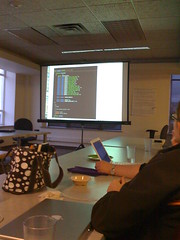
Open Source Bridge ended yesterday at midnight. We wrapped things up at the Hacker Lounge, with interviews courtesy of Strange Love Live, and tons of hackers still coding through the evening. My head was just buzzing from all of the great conversations I’ve had over the last three days.
Thank you to all of the speakers, volunteers and my fellow board members, Audrey Eschright and Jake Kuramoto. Thank you to the core organizing committee, designers and hackers – Reid, Igal, Rick, Adam, Bram and osbridgebot. Thank you to Christie Koehler who did an amazing job with managing volunteers these last three days.
Thank you especially to Peter Eschright, who swooped in and made sure that all of our Logistical issues were solved. Thank you Cami and Dr. Normal from Strange Love Live, and Kelly for all your advocacy work on behalf of the conference. Thank you Steph for your last minute awesome work on the speaker party. Thank you to Beer and Blog and WebTrends for hosting our evening party on Friday *and* our speaker party.
Thank you Amber Case, Kurt von Finck, Mayor Sam Adams and Ward Cunningham for giving entertaining and inspiring keynotes each day. Thanks to Chris Messina for helping kick off our unconference on Friday.
Thank you everyone who came and participated in the conference. Your enthusiasm and passion was inspiring. I appreciated all of the encouragement you gave me and all the other volunteers throughout the time we were there together. All those kind words add up, and so many people were just glowing from the praise.
If you attended the conference, respond to our survey! Also, comments are open on sessions, so please leave comments about the specific sessions you attended. We’ll forward the feedback to the speakers.
I’m still smiling, and soaking it all in. But we’re definitely doing this again next year. 🙂





